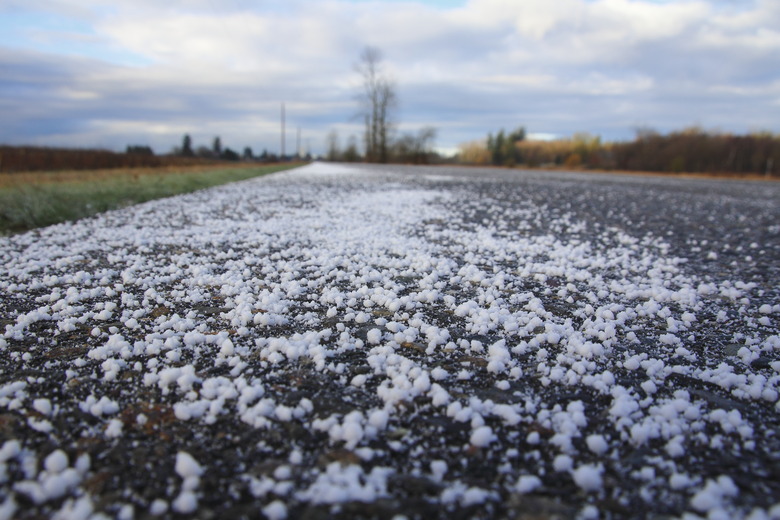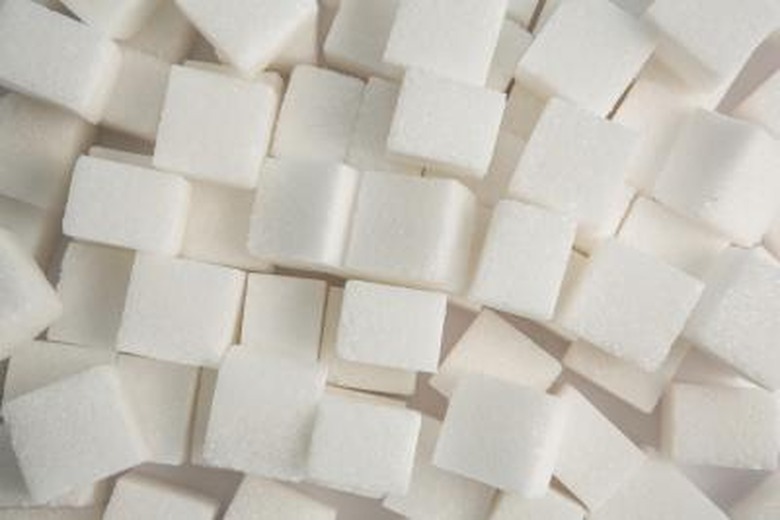Why Does Sugar Melt Ice?
It's common practice to spread ice on roadways to melt winter ice, but in the absence of ice, you could also use sugar. In fact, you could use any substance that dissolves in water. Sugar wouldn't work as well as salt, and there is the issue of all that sticky water turning roadside muck into taffy. But since it does lower the freezing point of water, ice would melt, as long as the outside temperature isn't too cold. The reason this happens is that any solute dissolved in water interferes with the ability of the water molecules to coalesce into a solid form.
TL;DR (Too Long; Didn't Read)
Sugar lowers the freezing point of water by binding with the water molecules and creating more space between them. This helps them overcome the electrostatic forces that bind them into a solid structure. The same is true for any substance that dissolves in water.
Of Water and Ice
Of Water and Ice
When water is in the solid state of ice, the molecules bind with each other into a crystal structure from which none of them has the energy to escape. As the temperature rises, the molecules gain vibrational energy and freedom of movement. At a critical point, they can break free of the electrostatic forces that bind them into a crystalline structure and move around more freely in the liquid state. You know this critical point well since it's the melting point at 32 degrees Fahrenheit (0 degrees Celsius).
When water is in the liquid state, and you lower the temperature, the molecules lose energy and eventually coalesce into a crystal structure. At this critical temperature, the freezing point, the molecules don't have enough energy to escape the electrostatic bonds they exert on one another, so they settle into a "dormant" state like a group of cats huddling together to escape the winter chill. Again, it's the electrostatic forces of attraction they exert on each other that cause this to happen.
Add a Little Sugar
Add a Little Sugar
Any solute that will dissolve in water lowers the freezing point for a fairly simple reason. When a substance dissolves, water molecules surround it and bind to it electrostatically. The solute provides space between the water molecules and decreases the attraction they exert on one another. As a result, they need less energy to maintain their freedom of movement and will stay in the liquid state at lower temperatures.
This happens whether the solute particles are individual ions, such as the sodium and chloride ions in salt, or large, complex molecules such as sucrose (table sugar), which has the chemical formula C12H22O11. With 45 atoms per molecule, sugar doesn't separate the water molecules as effectively as smaller, more strongly charged ions, which is why sugar doesn't lower the melting point as effectively as salt. Another related reason is that the effect on freezing point is dependent on the volume of solute. Because sugar molecules are so much larger than salt ions, fewer of them will fit into a given amount of water.
Sugar Doesn't Really Melt Ice
Sugar Doesn't Really Melt Ice
It's a little inaccurate to say that sugar melts ice. What actually happens is that it lowers the freezing point, so water can stay in the liquid state at a colder temperature. It does this by providing space between the water molecules and reducing their attraction on each other. If you throw sugar on ice at 30 degrees Fahrenheit (-1.1 degrees Celsius), the ice will melt, but if the temperature falls lower, the water will eventually freeze. The new freezing point is lower than that of pure water, but higher than it would be if you threw salt on the ice.
Cite This Article
MLA
Deziel, Chris. "Why Does Sugar Melt Ice?" sciencing.com, https://www.sciencing.com/sugar-melt-ice-5764444/. 26 April 2018.
APA
Deziel, Chris. (2018, April 26). Why Does Sugar Melt Ice?. sciencing.com. Retrieved from https://www.sciencing.com/sugar-melt-ice-5764444/
Chicago
Deziel, Chris. Why Does Sugar Melt Ice? last modified March 24, 2022. https://www.sciencing.com/sugar-melt-ice-5764444/



